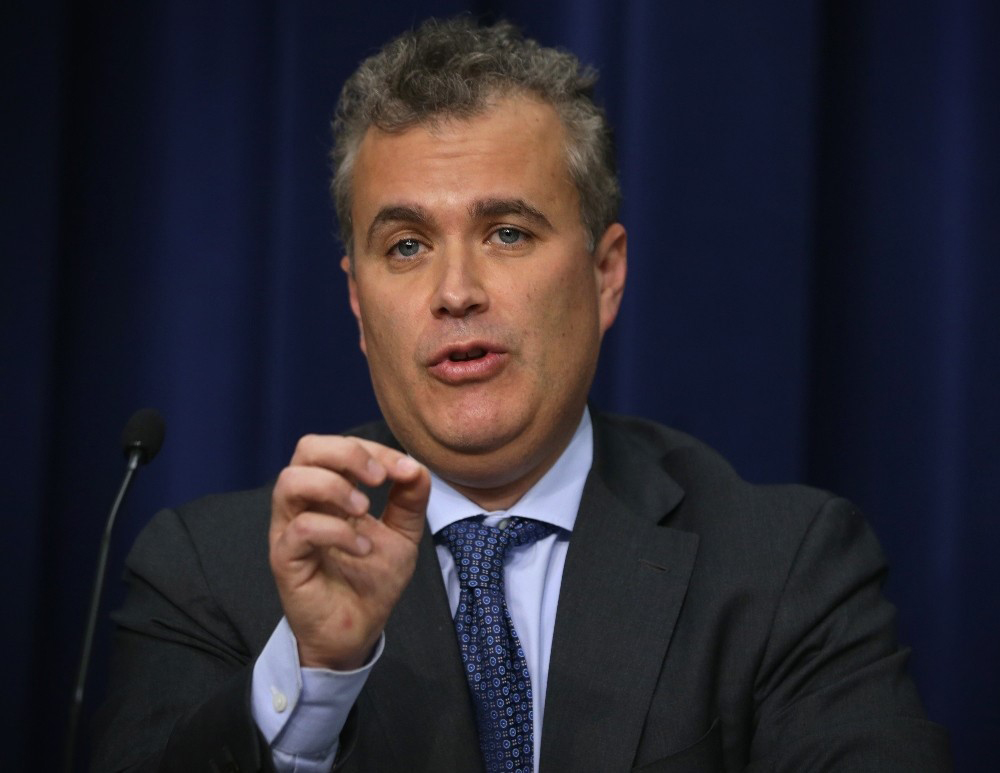
White House coronavirus response coordinator Jeff Zients
September 21 ,2021
-decision still to be made on which jabs will be accepted
Come November, Guyanese visiting the US must be fully vaccinated against COVID-19 and Washington is still to make a decision on which vaccines it will accept.
As of now, Guyanese can enter the US with a negative antigen test and there is no quarantine requirement.
Yesterday’s announcement by the US could severely impact Guyanese who want to travel to the US particularly if Washington declines to recognise the vaccines in use here.
Russia’s Sputnik V vaccine has formed the backbone of Guyana’s COVID campaign but it is yet to receive World Health Organisation (WHO) emergency use approval. Moreover, several days ago, the WHO suspended the approval procedures as an official said the manufacturing process of the jab had not met the necessary standards. WHO says they have delayed approving the jab until a new inspection can be carried out at one of the plants where Sputnik V is manufactured
The other two major vaccines in use here: AstraZeneca and Sinopharm have secured emergency use approval by the WHO but not from the US. While the US has stockpiled AstraZeneca, the Anglo-Swedish jab is still to get approval from the US Food and Drug Administration (FDA) for emergency use. The US which has vaccinated its population with the in-demand Pfizer-BioNTech jab, and Moderna and Johnson and Johnson vaccines, has been donating its AstraZeneca stockpile abroad.
If Washington doesn’t clear the Sputnik V, Sinopharm and AstraZeneca vaccines for international travelers, Guyanese would not be able to travel to the US or alternatively they could face a quarantine requirement if one is set.
Guyanese adolescents are being vaccinated with Pfizer-BioNTech which means that once they got two jabs they would be able to travel to the US. Guyana has also received 34,000 of the single-dose Johnson and Johnson vaccine which means that those persons would be eligible to travel to the US as this is an FDA-approved vaccine. The Johnson and Johnson shot is being used in the hinterland regions of the country.
Washington is still hammering out details on what the exact requirements will be and Guyanese face an anxious wait to see what will be eventually agreed.
33 countries
Reuters yesterday reported that the US in November will re-open for air travelers from 33 countries including China, India, Brazil and most of Europe who are fully vaccinated against COVID-19.
The decision, announced by White House coronavirus response coordinator Jeff Zients, marked an abrupt shift for the Biden administration which last week said it was not the right time to lift any restrictions amid rising COVID-19 cases.
Reuters said that the United States had lagged many other countries in lifting such restrictions, and allies including Britain and Germany welcomed the move. The U.S. restrictions have barred travelers from most of the world including tens of thousands of foreign nationals with relatives or business links in the United States.
Restrictions on non-U.S. citizens were first imposed on air travelers from China in January 2020 by then-President Donald Trump and then applied to dozens of other countries, without any clear rules for how and when to lift them.
Reuters said that the United States will admit fully vaccinated air travelers from the 26 so-called Schengen countries in Europe including France, Germany, Italy, Spain, Switzerland and Greece, as well as Britain, Ireland, China, India, South Africa, Iran and Brazil. The existing policy has barred non-U.S. citizens who were in those countries within 14 days.
Zients did not give a precise start date for the new arrangement beyond saying “early November.”
Reuters noted that the United States has allowed foreign air travelers from more than 150 countries throughout the pandemic. Its action yesterday means that new COVID-19 vaccine requirements will now apply to nearly all foreign nationals flying to the United States – including those not subject to the prior restrictions.
“Critics had said that the US travel restrictions no longer made sense because some countries with high COVID-19 rates were not on the restricted list while some countries on the list have the pandemic more under control”, Reuters reported.
The report said that Americans travelling from abroad who are not vaccinated will face tougher rules than vaccinated citizens, including needing to show proof of a negative COVID-19 test within a day of travel and proof of purchasing a viral test to be taken after arrival.
Which vaccines?
According to Reuters, the White House said federal health authorities will decide which vaccines qualify, including if those not approved by US regulators will be acceptable. Foreign nationals will need to present proof of vaccination before travel and will not be required to quarantine upon arrival, the report said.
Exceptions to the vaccine policy include children not yet eligible for shots.
Trump in January issued an order to lift restrictions on 27 European countries, but it was blocked by Biden before taking effect. Biden also added India and South Africa to the restricted list.
Zients said on Sept. 15 that given the rise of the Delta variant, it was not the right time to lift travel restrictions. Asked yesterday what changed since then, Reuters said that Zients cited rising global vaccinations, adding: “The new system allows us to implement strict protocols to prevent the spread of COVID-19.”
Zients said the new system will include collecting contact tracing data from passengers traveling into the United States to enable the CDC to contact travelers exposed to COVID-19.
Separately yesterday, the United States extended its pandemic-related restrictions at land borders with Canada and Mexico that bar nonessential travel such as tourism through Oct. 21, while giving no indication if it would apply the vaccine rules to those borders.
